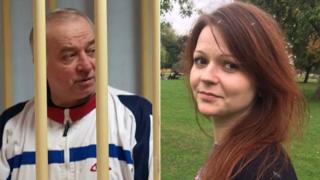Russian spy: Yulia Skripal 'improving rapidly'
 Image copyright
EPA/ Yulia Skripal/Facebook
Image copyright
EPA/ Yulia Skripal/Facebook
Yulia Skripal is "improving rapidly" and no longer in a critical condition, four weeks after the Salisbury poisoning, the hospital has said.
The daughter of ex-spy Sergei Skripal was admitted they came into contact with a nerve agent. on 4 March.
"She has responded well to treatment but continues to receive expert clinical care 24 hours a day," the hospital said.
Mr Skripal remains in a critical but stable condition.
- Russian spy: What we know so far
- Nato slashes Russia staff after poisoning
- Spy's front door focus of poisoning probe
"I want to take this opportunity to once again thank the staff of Salisbury District Hospital for delivering such high quality care to these patients over the last few weeks," said Dr Christine Blanshard, Medical Director for Salisbury District Hospital.
"I am very proud both of our front-line staff and all those who support them."
The Skripals were admitted to hospital after being found collapsed on a bench at the Maltings shopping centre in Salisbury.
Police have been treating the case as attempted murder.
On Wednesday, police said the Skripals first came into contact with the nerve agent at his home in Salisbury.
Forensic tests show the highest concentration was found on the front door.
The nerve agent was found at other locations in the town but in lower concentrations, the Metropolitan Police said.
A police officer who fell seriously ill after responding to the attack - Det Sgt Nick Bailey - was treated in hospital but was discharged on 22 March.
DS Bailey, who is believed to have visited Mr Skripal's house after the incident has spoken of his ordeal, saying: "Normal life for me will probably never be the same."
The British government has accused the Russian state of involvement in the attack - a claim Moscow has denied.
Prime Minister Theresa May said the chemical used in the attack had been identified as being part of a group of nerve agents developed by Russia known as Novichok.